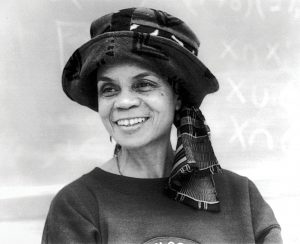Creating Social Values Through Poetry
by Bettina Figl
 81-year-old Sonia Sanchez, whose poems talk about rape, violence and death, has never shied away from taboos. For many, she is an icon.
81-year-old Sonia Sanchez, whose poems talk about rape, violence and death, has never shied away from taboos. For many, she is an icon.
“What does it mean to be human?” is one of poet Sonia Sanchez’s favorite questions. The 81-year-old, who emerged in the black arts movement in the 1960s, and established black women studies at universities in California, doesn’t waste time over trivialities.
“How I tell the truth is a part of truth itself,” says Sanchez. The fact that she never makes anything up adds to the power of her poems, which often address rape, violence and death.
Filmmaker Sabrina Schmidt Gordon, who recently published a documentary on Sanchez called “BaddDDD Sonia Sanchez,” discovered the work of the poet at the age of 12. “I was shocked by what I read, but it also felt like an awakening,” she says. “I remember thinking ‘I didn’t know you could say that?’” Until then, she hadn’t realized that she had, as she describes, “bought into limitations in terms of expression and permission to speak truth to power. I remember it as both a revelation and a liberation. I can’t say that I’ve always lived up to the possibility her work made real to me, but it certainly changed the way I thought about agency, the power of words, and owning one’s voice.”
“Harlem was a hard place to be raised in”
Sanchez was born in Birmingham, Ala. Her mother died when she was 2, and she then lived with her grandmother, who died a few years later, so she was transplanted from one relative to another. In 1943, she and her father moved to Harlem. Sanchez still remembers their tiny apartment with a wall in front of her window – this is why to this day, she doesn’t sleep in hotel rooms without a view.
“Harlem was a hard place to be raised in,” says Sanchez. Her father, a teacher, couldn’t find a job – schools in New York rejected him because he was southern-educated, says Sanchez – so he worked in a factory producing goods for Vietnam War. As a child, Sanchez loved school and reading. Her father described her as “a quiet child,” Sanchez says and laughs, because that changed when she met “some leftists” and got involved in the Civil Rights movement.
“The march to Washington in 1963 was amazing,” says Sanchez. She was a member of the Congress for Racial Equality, where she met Malcolm X, and joined the Nation of Islam in 1972, which she later left because of the organization’s conservative view on women’s rights.
Though Sanchez doesn’t believe that one needs to study at a university to become a poet, she spent her much of her life at universities: She studied literature at Hunter College and NYU, where her first poem was published in the Minnesota Review while she was still in her first semester. Later, she became a literature professor herself, taught at eight universities and lectured at more than 500 college campuses. In California, she was the first to create and teach a course on black women and literature in the country.
“I love teaching,” she says. “You see people coming in one way, and leaving in another way.” From her own teacher, New Yorker poetry editor Louise Bogan, she learned discipline, says Sanchez. “Louise Bogan would say you have to write, even if you don’t want to. Just let it flow.“
“Writing poetry kept me alive”
Self-discipline has been a key principle in Sanchez’s life. The days of the single mom of three children followed a strict routine: She taught, cooked, helped the kids with their homework. When they went to sleep, she corrected papers until late. After midnight, she worked on her own poetry. With her alarm clock set at 5 a.m., she went years with three hours of sleep a night. “That kept me alive,” says Sanchez. After teaching for 40 years, she retired, but she still teaches, lectures and travels. Currently, Sanchez appears as a guest reader in an online course at Harvard called “modernism in America”.
Lisa New, the poetry professor at Harvard who created the series, says Sanchez reminds her of another famous American poet, Juan Felipe Herrera. She describes them as “thinkers of themselves” and both their work as very accessible and bilingual.
On the phone or in other casual conversations, Sanchez likes to address with “my dear sister.” On stage, she can suddenly bust into singing. Her poetry is strongly rooted in her voice and highly rhythmical, similar to spoken word or hip-hop:
This is a poem about you / you / fun-loving men and women / You flint and feather men and women / You country and cathedral men and women / with hearts in your mouths / singing the morning when and becoming the when / tearing the wings off ignorance and greed and war and guns and assassination / and miseducation, no education / poverty, arrogance, war, war, war, war, war, war / war to yourself and the music of a Spanish guitar / forever strumming racial, sexual, economic, justice / peace, peace, peace (. . . )” said Sanchez in a TED talk on “what does it mean to be human”, and she wants people to understand: “We are all the same. We have to learn to respect each other. A poet is a creator of social values.”